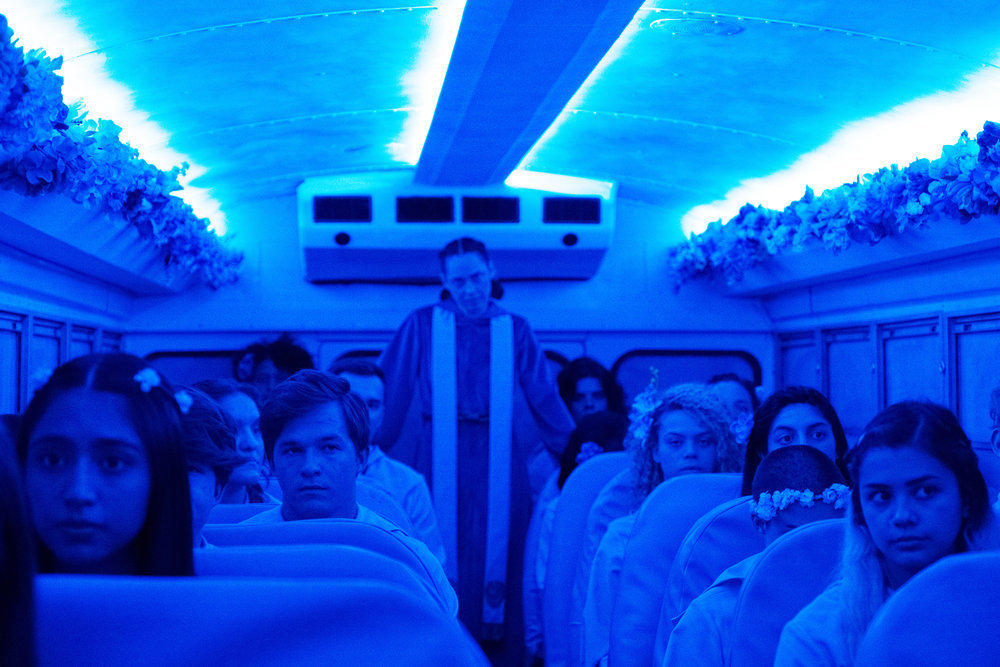Who would have guessed that 2013’s “The Purge” would start one of the most robust franchises in entertainment, spawning three profitable sequels—“The Purge: Anarchy,” “The Purge: Election Year,” and “The First Purge”—and now a TV series on the USA Network written by the man who created the first film, James DeMonaco, and produced by Jason Blum, and the men of Platinum Dunes. “The Purge” imagined a world in which all crime would be legal for 12 hours one time a year, ostensibly to rid the human condition of its propensity for violence. I thought it worked, especially thanks to the committed performance from Ethan Hawke, who elevates everything he’s in.
With all the potential stories inherent in such a concept, it makes sense that it would eventually be turned into a B-TV show, but “The Purge: The Series” may have worked better in the immediate aftermath of the first hit film, or a few years from now. As is, so hot on the heels of the other movies, as well as the impassioned state of the country as a whole, it feels too much like an afterthought, like subplots deleted from the films. There are times when it works—which is something that could be said about most of the movies too—but it’s hard to imagine people getting excited to tune in week after week.

If you’re thinking that “The Purge” is essentially a ten-hour version of one of the sequels, you’re not wrong. The format allows for a bit more character development than the films, but people don’t really come to this world for the characters, and it’s surprisingly light on actual plot twists, at least during the first three episodes sent for press. Like a lot of USA shows, there’s just enough to keep you engaged as the show jumps from subplot to subplot, likely tying them all together before the season is over. If somehow you haven’t seen the sequels and/or aren’t exhausted by the concept, there might be enough for you here on lazy Tuesday night, but with more new programming premiering over the next month and a half than this TV critic can ever remember, “It’s OK” just doesn’t cut it for most people.
We essentially follow three narratives on the night of The Purge, at three different economic levels. Miguel (Gabriel Chavarria) is a Marine come home from serving overseas to find his missing sister Penelope (Jessica Garza), who he learns has joined a cult of people who sacrifice themselves on Purge Night, driving a bus around town and offering their members up for murder. Penelope and Miguel’s parents were killed the night of the first purge, and she’s never gotten over it, ready to go to the great beyond and see her lost loved ones. Miguel sets out on a quest through the violent purge landscape to find his sis. This is the most action-packed arc.

Meanwhile, Jane (Amanda Warren) works at a financial firm that has a major deal to close on Purge Night—international business doesn’t stop for stupid American bullshit. All of her co-workers have agreed to behave on Purge Night, and there’s even security that guarantees their safety as long as they stay on the floor. In flashbacks, we see how Jane has been passed over for promotion by her sleazy boss (William Baldwin), and it’s not long before Jane reveals that she has a plan for this Purge Night that no one at the company will forget.
Finally, there’s the socialite arc as a couple named Jenna (Hannah Emily Anderson) and Rick (Colin Woodell) go to a notorious party at the mansion of Albert Stanton (Reed Diamond), intending to ask him to invest in their business. They’ll be safe for Purge Night in a guarded mansion—they just have to survive the asshole elite and get over the relationship both Jenna and Rick had with Albert’s daughter Lila (Lili Simmons). Naturally, every “Purge” iteration has featured very rich people behaving very badly on Purge Night, so it’s not hard to predict that Jenna and Rick’s night will feature more than a few horrors.
Of course, the writers take almost no chances to comment on actual issues of the day—imagine if they had the nerve to have plots that reflected the national conversations around issues like #MeToo or immigration. When a character says in the premiere that they made this country great again, that’s as close as “The Purge” gets to political commentary. Before you dive into the comments with the complaint that not everything has to be addressed through a political lens, remember that this entire franchise hinges on issues of social and economic inequity—it’s inherently political. It’s just a shame that they don’t do more with it here, especially since they don’t replace the lack of social insight with real B-movie escapism. Be smart TV or be enjoyably dumb TV. Just don’t be boring TV.












